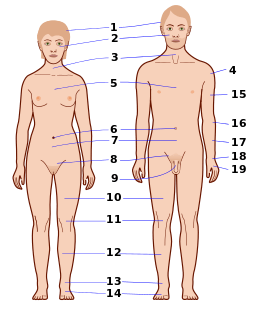Definify.com
Webster 1913 Edition
Face
Face
We have been glad of yore.
Face
This tempest, and deserve the name of king.
Face
,Webster 1828 Edition
Face
FACE
,Definition 2026
face
face
English
Noun
face (plural faces)
- (anatomy) The front part of the head, featuring the eyes, nose, and mouth and the surrounding area.
- She has a pretty face.
- 1918, W. B. Maxwell, chapter 10, in The Mirror and the Lamp:
- It was a joy to snatch some brief respite, and find himself in the rectory drawing–room. Listening here was as pleasant as talking; just to watch was pleasant. The young priests who lived here wore cassocks and birettas; their faces were fine and mild, yet really strong, like the rector's face; and in their intercourse with him and his wife they seemed to be brothers.
- 1963, Margery Allingham, chapter 7, in The China Governess:
- ‘Children crawled over each other like little grey worms in the gutters,’ he said. ‘The only red things about them were their buttocks and they were raw. Their faces looked as if snails had slimed on them and their mothers were like great sick beasts whose byres had never been cleared. […]’
- One's facial expression.
- Why the sad face?
- The public image; outward appearance.
- The face of this company. He managed to show a bold face despite his embarrassment.
- The frontal aspect of something.
- The face of the cliff loomed above them.
- (figuratively) Presence; sight; front.
- to fly in the face of danger; to speak before the face of God
- 1920, Mary Roberts Rinehart, Avery Hopwood, The Bat, chapterI:
- The Bat—they called him the Bat. Like a bat he chose the night hours for his work of rapine; like a bat he struck and vanished, pouncingly, noiselessly; like a bat he never showed himself to the face of the day.
- The directed force of something.
- They turned to boat into the face of the storm.
- Good reputation; standing in the eyes of others; dignity; prestige. (See lose face, save face).
- Shameless confidence; boldness; effrontery.
- John Tillotson (1630-1694)
- This is the man that has the face to charge others with false citations.
- John Tillotson (1630-1694)
- The width of a pulley, or the length of a cog from end to end.
- a pulley or cog wheel of ten inches face
- (geometry) Any of the flat bounding surfaces of a polyhedron. More generally, any of the bounding pieces of a polytope of any dimension.
- Any surface; especially a front or outer one.
- Put a big sign on each face of the building that can be seen from the road. They climbed the north face of the mountain. She wanted to wipe him off the face of the earth.
- Bible, Genesis ii.6:
- A mist […] watered the whole face of the ground.
- Lord Byron (1788-1824)
- Lake Leman woos me with its crystal face.
- The numbered dial of a clock or watch, the clock face.
- (slang) The mouth.
- Shut your face! He's always stuffing his face with chips.
- (slang) Makeup; one's complete facial cosmetic application.
- I'll be out in a sec. Just let me put on my face.
- (slang, professional wrestling) Short for baby face. A wrestler whose on-ring persona is embodying heroic or virtuous traits.
- The fans cheered on the face as he made his comeback.
- (cricket) The front surface of a bat.
- (golf) The part of a golf club that hits the ball.
- (card games) The side of the card that shows its value (as opposed to the backside, which looks the same on all cards of the deck).
- (typography) A typeface.
- Mode of regard, whether favourable or unfavourable; favour or anger.
- (computing) An interface.
- 2003 May 14, Bart Leeten, Kris Meukens, JSR127 JavaServer Faces, VERSIE, p.1/6:
- For clarity reasons and to stress that JavaServer Faces is not only about ‘visual’ user interfaces, we propose to use the term ‘face’, to express what for visual interfaces is typically named a ‘screen’.
- 2003 May 14, Bart Leeten, Kris Meukens, JSR127 JavaServer Faces, VERSIE, p.1/6:
- The amount expressed on a bill, note, bond, etc., without any interest or discount; face value.
- (Can we find and add a quotation of McElrath to this entry?)
Synonyms
- (part of head): countenance, visage, phiz (obsolete), phizog (obsolete), see also Wikisaurus:countenance
- (facial expression): countenance, expression, facial expression, look, visage, see also Wikisaurus:facial expression
- (the front or outer surface): foreside
- (public image): image, public image, reputation
- (of a polyhedron): facet (different specialised meaning in mathematical use), surface (not in mathematical use)
- (slang: mouth): cakehole, gob, mush, piehole, trap, see also Wikisaurus:mouth
- (slang: wrestling): good guy, hero
Antonyms
- (baby face): heel
Derived terms
|
Related terms
Translations
|
|
|
|
|
|
|
|
|
Verb
face (third-person singular simple present faces, present participle facing, simple past and past participle faced)
- (transitive, of a person or animal) To position oneself or itself so as to have one's face closest to (something).
- Face the sun.
- 1915, Emerson Hough, The Purchase Price, chapterI:
- Serene, smiling, enigmatic, she faced him with no fear whatever showing in her dark eyes. The clear light of the bright autumn morning had no terrors for youth and health like hers.
- (transitive, of an object) To have its front closest to, or in the direction of (something else).
- Turn the chair so it faces the table.
- John Milton (1608-1674)
- He gained also with his forces that part of Britain which faces Ireland.
- (transitive) To cause (something) to turn or present a face or front, as in a particular direction.
- 1963, Ian Fleming, On Her Majesty's Secret Service
- The croupier delicately faced her other two cards with the tip of his spatula. A four! She had lost!
- 1963, Ian Fleming, On Her Majesty's Secret Service
- (transitive) To deal with (a difficult situation or person).
- I'm going to have to face this sooner or later.
- John Dryden (1631-1700)
- I'll face / This tempest, and deserve the name of king.
- 2013 June 7, Joseph Stiglitz, “Globalisation is about taxes too”, in The Guardian Weekly, volume 188, number 26, page 19:
- It is time the international community faced the reality: we have an unmanageable, unfair, distortionary global tax regime. It is a tax system that is pivotal in creating the increasing inequality that marks most advanced countries today […].
- 2013 June 8, “Obama goes troll-hunting”, in The Economist, volume 407, number 8839, page 55:
- According to this saga of intellectual-property misanthropy, these creatures [patent trolls] roam the business world, buying up patents and then using them to demand extravagant payouts from companies they accuse of infringing them. Often, their victims pay up rather than face the costs of a legal battle.
- (intransitive) To have the front in a certain direction.
- The bunkers faced north and east, toward Germany.
- (transitive) To have as an opponent.
- 2011 September 2, Phil McNulty, “Bulgaria 0-3 England”, in BBC:
- And a further boost to England's qualification prospects came after the final whistle when Wales recorded a 2-1 home win over group rivals Montenegro, who Capello's men face in their final qualifier.
-
- (intransitive, cricket) To be the batsman on strike.
- (obsolete) To confront impudently; to bully.
- William Shakespeare (c.1564–1616)
- I will neither be faced nor braved.
- William Shakespeare (c.1564–1616)
- To cover in front, for ornament, protection, etc.; to put a facing upon.
- a building faced with marble
- To line near the edge, especially with a different material.
- to face the front of a coat, or the bottom of a dress
- To cover with better, or better appearing, material than the mass consists of, for purpose of deception, as the surface of a box of tea, a barrel of sugar, etc.
- (engineering) To make the surface of (anything) flat or smooth; to dress the face of (a stone, a casting, etc.); especially, in turning, to shape or smooth the flat surface of, as distinguished from the cylindrical surface.
Synonyms
Derived terms
Translations
|
|
|
|
|
See also
-
 Face on Wikipedia.Wikipedia
Face on Wikipedia.Wikipedia
-
 Face (geometry) on Wikipedia.Wikipedia
Face (geometry) on Wikipedia.Wikipedia
-
 Face (hieroglyph) on Wikipedia.Wikipedia
Face (hieroglyph) on Wikipedia.Wikipedia
-
 Face (mining) on Wikipedia.Wikipedia
Face (mining) on Wikipedia.Wikipedia
-
 Face (sociological concept) on Wikipedia.Wikipedia
Face (sociological concept) on Wikipedia.Wikipedia
Statistics
Anagrams
French
Etymology
From Middle French and Old French face, from Vulgar Latin *facia, from Latin faciēs (“face, shape”).
Pronunciation
Noun
face f (plural faces)
Derived terms
See also
Anagrams
Friulian
Etymology
From Vulgar Latin *facia, from Latin faciēs (“face, shape”).
Noun
face f (plural facis)
Latin
Noun
face
- ablative singular of fax
Verb
face
- second-person singular present imperative active of faciō
Middle English
Etymology
Borrowing from Old French face, from Vulgar Latin *facia < Classical Latin faciēs.
Noun
face (plural faces)
- (anatomy) face
- 14th Century, Chaucer, General Prologue
- Boold was hir face, and fair, and reed of hewe.
- Bold was her face, and fair, and red of hue.
- Boold was hir face, and fair, and reed of hewe.
- 14th Century, Chaucer, General Prologue
Synonyms
Descendants
- English: face
Old French
Etymology
From Vulgar Latin *facia, from Latin faciēs (“face, shape”).
Noun
face f (oblique plural faces, nominative singular face, nominative plural faces)
- (anatomy) face
- circa 1170, Chrétien de Troyes, Érec et Énide:
- Le chief li desarme et la face.
- He exposed his head and his face.
- Le chief li desarme et la face.
- circa 1155, Wace, Le Roman de Brut:
-
Li rois regarda li deus freres
A cors bien fais, a faces cleres- The king looked at the two brothers
With their well-built bodies and clear faces
- The king looked at the two brothers
-
Li rois regarda li deus freres
- 1303, Bernard de Gordon, Fleur de lis de medecine (a.k.a. lilium medicine), page 148 of this essay:
-
Les signes subsequens est face enflée […]
- the symptoms are the following: swollen face […]
-
Les signes subsequens est face enflée […]
- circa 1170, Chrétien de Troyes, Érec et Énide:
Synonyms
Descendants
Portuguese

Etymology
From Old Portuguese façe, faz, from Latin faciēs.
Pronunciation
Noun
face f (plural faces)
Synonyms
References
- “façe” in Dicionario de dicionarios do galego medieval.
Romanian
Etymology
From Latin facere, present active infinitive of faciō[1], from Proto-Italic *fakiō, from Proto-Indo-European *dʰeh₁- (“to put, place, set”). The verb's original past participle was fapt, from factum, but was changed and replaced several centuries ago. An alternative third-person simple perfect, fece, from fecit, was also found in some dialects.[2]
Pronunciation
- IPA(key): [ˈfatʃe]
Verb
a face (third-person singular present face, past participle făcut) 3rd conj.
Conjugation
| infinitive | a face | ||||||
|---|---|---|---|---|---|---|---|
| gerund | făcând | ||||||
| past participle | făcut | ||||||
| number | singular | plural | |||||
| person | 1st person | 2nd person | 3rd person | 1st person | 2nd person | 3rd person | |
| indicative | eu | tu | el/ea | noi | voi | ei/ele | |
| present | fac | faci | face | facem | faceți | fac | |
| imperfect | făceam | făceai | făcea | făceam | făceați | făceau | |
| simple perfect | făcui | făcuși | făcu | făcurăm | făcurăți | făcură | |
| pluperfect | făcusem | făcuseși | făcuse | făcuserăm | făcuserăți | făcuseră | |
| subjunctive | eu | tu | el/ea | noi | voi | ei/ele | |
| present | să fac | să faci | să facă | să facem | să faceți | să facă | |
| imperative | — | tu | — | — | voi | — | |
| affirmative | fă | faceți | |||||
| negative | nu face | nu faceți | |||||

